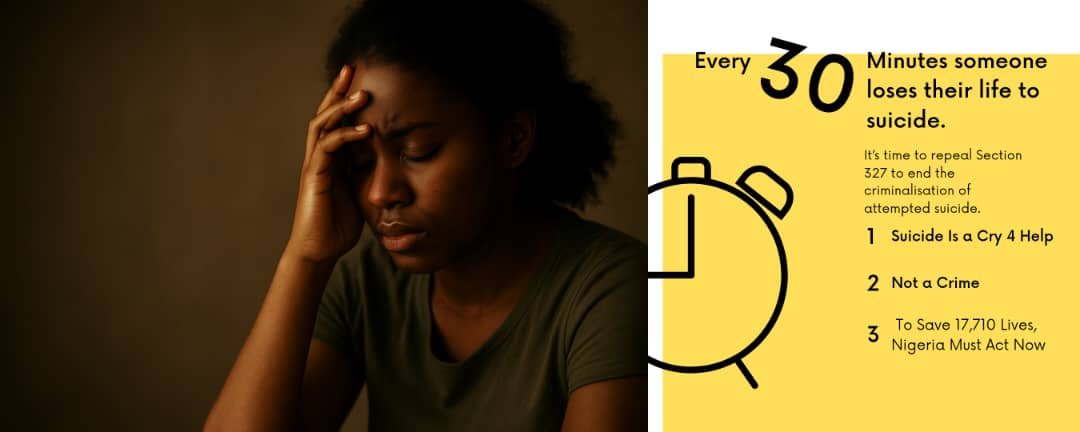
ABUJA, Nigeria- Every 10th of September, Nigeria joins the rest of the world in marking World Suicide Prevention Day. In 2025, the story remains the same—but this year, Africa Health Report, (AHR) raises urgent concerns, lifting the veil on one of the nation’s most pressing yet neglected public health emergencies: suicide.
Across the country, thousands silently battle depression, anxiety, and despair. Yet instead of finding support, many face criminal prosecution under Section 327 of the Criminal Code—a colonial-era law that punishes attempted suicide with imprisonment.
In this report, Chukwu Obinna examines the statistics, the human stories, and the urgent demand for legal reform—a call that could determine whether Nigeria finally chooses compassion over punishment, and progress over silence.
The Hidden Crisis Behind the Silence
Health professionals, legal experts, and survivors insist this punitive approach is not only outdated but deadly. As one doctor put it:
“Suicide is a cry for help, not a crime. By criminalising it, we are punishing pain instead of treating it.”
The urgent question on this World Suicide Prevention Day is simple: how many more lives must Nigeria lose before it chooses compassion over punishment?
Nigeria’s Suicide Burden: A Crisis in Numbers
Suicide in Nigeria is both widespread and underreported. The World Health Organization (WHO) estimates that around 17, 710 Nigerians die by suicide every year—that’s one life lost every 30 minutes.
According to the Nigeria Suicide Prevention Initiative (NSPI), suicide is the second leading cause of death among Nigerians aged 15–29.
It added that 85% of cases involve young people aged 15–35 and about 70% of people with suicidal thoughts never seek professional help, fearing stigma or prosecution.
With only 250 psychiatrists for over 200 million people, Nigeria has one of the world’s largest treatment gaps.
Less than 0.5% of the national health budget goes to mental health.
“These numbers are not just statistics—they represent broken families and communities grieving in silence,” says Dr Halima Bello, a clinical psychologist in Abuja.
Criminalisation and Stigma: A Double Threat
Nigeria’s legal system treats suicide as a crime instead of a health condition. Section 327 prescribes up to one year in prison for attempted suicide.
“Criminalisation is counterproductive,” explains Dr Uba Ike, a medical doctor. “Instead of seeking treatment, people hide their pain out of fear of arrest, disgrace, or rejection.”
Human rights lawyer Kolade Raji agrees: “The law sends the wrong message—it reinforces stigma, discourages people from speaking up, and violates human rights. To repeal Section 327 is to restore dignity.”
Cultural and Religious beliefs Deepen the Silence.
In many Nigerian communities, suicide is seen as weakness, sin, or family shame. Survivors often face ridicule, abandonment, or outright rejection.
For Ada (name changed), a 24-year-old graduate who attempted suicide, the trauma was compounded by humiliation:
“Instead of help, I was treated like a criminal. The police questioned me, and my family called me a disgrace. I felt more broken than before.”
Lessons from Africa and Beyond
Nigeria’s hesitation contrasts with progress in other African nations.
Ghana decriminalised suicide in 2019, leading to an increase in people seeking help without fear.
Kenya is reviewing its suicide laws, recognising that punishment fuels silence.
Globally, over 77% of suicides occur in low- and middle-income countries, where stigma and poor mental health services collide.
“Decriminalisation works,” insists Mr Raji. “Ghana shows us that when people are no longer treated as criminals, they are more likely to seek care. Nigeria has no excuse for delay.”
Survivors’ Stories: Voices from the Shadows
Behind every number is a story of struggle.
Musa (name changed), 32, attempted suicide after losing his job during the COVID-19 pandemic.
“If there had been a hotline or a safe centre, I would have reached out. Instead, I stayed silent until it nearly cost me my life.”
Both Ada and Musa’s experiences expose the hidden cruelty of criminalisation: it traps survivors in silence and shame, robbing them of the chance to heal.
Why Legal Reform Is Non-Negotiable
The Mental Health Act of 2023 replaced the colonial-era Lunacy Act of 1958, a step forward. But it failed to repeal Section 327, leaving attempted suicide a criminal offence.
“Without repeal, the Mental Health Act is like a house built without a foundation,” argues Dr Bello. “You cannot promote mental health while punishing despair.”
For reform advocates, repealing Section 327 is the first step toward a humane suicide prevention policy. Anything less is a betrayal of Nigeria’s most vulnerable citizens.
The Way Forward: A National Suicide Prevention Strategy
Experts agree that suicide prevention in Nigeria requires a comprehensive national strategy, with key recommendations including to repeal Section 327 in order to put an end the criminalisation of attempted suicide, increase funding by dedicate at least 5% of the health budget to mental health, train more psychiatrists, psychologists, and community health workers, establish nationwide suicide hotlines, safe crisis centres, and mobile response teams and train teachers, health workers, and police officers in early intervention among others.
“Every suicide is preventable,” insists Dr Bello. “But prevention requires investment, education, and compassion at every level of society.”
Until the Law Changes: The Human Cost of Delay
For now, thousands of Nigerians battling suicidal thoughts remain trapped in silence, caught between a weak health system and a punitive law. Families continue to lose loved ones, while stigma ensures survivors carry invisible scars.
For Ada and Musa, the damage is already done. For those yet to come, reform could mean the difference between life and death.
On this World Suicide Prevention Day 2025, Nigeria faces a choice: continue down the path of silence and punishment, or embrace compassion, reform, and prevention.
As Nigerians echo: “Suicide is a cry for help, not a crime.”
The time to act is now.




